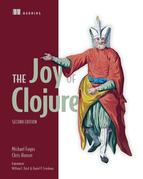Book Description
Summary
The Joy of Clojure, Second Edition is a deep look at the Clojure language. Fully updated for Clojure 1.6, this new edition goes beyond just syntax to show you the "why" of Clojure and how to write fluent Clojure code. You'll learn functional and declarative approaches to programming and will master the techniques that make Clojure so elegant and efficient.
About the Technology
The Clojure programming language is a dialect of Lisp that runs on the Java Virtual Machine and JavaScript runtimes. It is a functional programming language that offers great performance, expressive power, and stability by design. It gives you built-in concurrency and the predictable precision of immutable and persistent data structures. And it’s really, really fast. The instant you see long blocks of Java or Ruby dissolve into a few lines of Clojure, you’ll know why the authors of this book call it a “joyful language.” It’s no wonder that enterprises like Staples are betting their infrastructure on Clojure.
About the Book
The Joy of Clojure, Second Edition is a deep account of the Clojure language. Fully updated for Clojure 1.6, this new edition goes beyond the syntax to show you how to write fluent Clojure code. You’ll learn functional and declarative approaches to programming and will master techniques that make Clojure elegant and efficient. The book shows you how to solve hard problems related to concurrency, interoperability, and performance, and how great it can be to think in the Clojure way.
Appropriate for readers with some experience using Clojure or common Lisp.
What’s Inside
Build web apps using ClojureScript
Master functional programming techniques
Simplify concurrency
Covers Clojure 1.6
About the Authors
Michael Fogus and Chris Houser are contributors to the Clojure and ClojureScript programming languages and the authors of various Clojure libraries and language features.
Table of Contents
- Copyright
- Brief Table of Contents
- Table of Contents
- Praise for the First Edition
- Foreword to the Second Edition
- Foreword to the First Edition
- Preface
- Acknowledgments
- About this Book
- About Clojure
- About the Cover Illustration
- Part 1. Foundations
- Part 2. Data types
- Part 3. Functional programming techniques
- Part 4. Large-scale design
- Part 5. Host symbiosis
- Part 6. Tangential considerations
- Resources
- Index
- List of Figures
- List of Tables
- List of Listings
